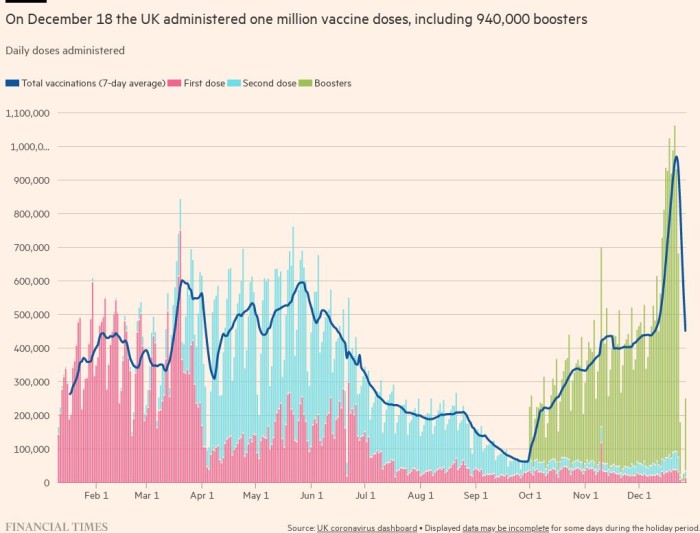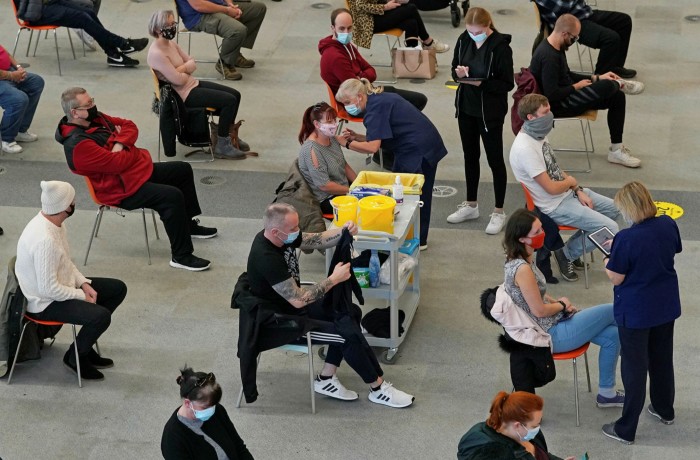
[ad_1]
When Boris Johnson announced that all over-18s in England would be offered a Covid-19 booster by the end of the month, firing up a desperate race between the vaccines and the highly transmissible Omicron variant, the impact on the nation was immediate.
Dr Mayura Balasubramaniam, an NHS urology surgeon overseeing vaccinations at his partner’s pharmacy in Greenwich, south London, recalled that when staff opened the store on Monday, just hours after Johnson’s dramatic televised pledge, they were confronted with a queue that snaked for more than half a mile around the block.
Balasubramaniam, who with his team sometimes works until 4am preparing for the coming day’s vaccinations before opening at 9am for a 12-hour stint, has quickly ramped up to 700 jabs a day. “So long as we still have supplies of vaccines, we will vaccinate everyone until there are no more people,” he said.
In a week that has seen infections doubling about every two days to reach record levels, the mobilisation of the entire UK health service, backed by the army and thousands of volunteers, has revived classic David-versus-Goliath tropes from the country’s history.
Gayle Fentiman, strategy manager at a charity who was waiting with her partner for a third booster jab at the pharmacy on Thursday, reflected the heightened national mood. “We were getting to a place where we accepted that Covid is part of daily life and you just have to get on with it. Now it’s got scary again,” she said.
With the UK at the epicentre of the global outbreak, other countries are closely watching the country’s response as they brace for the full impact of the new strain.

But victory is far from assured. On Thursday a record 745,000 booster shots went into arms — a sharp increase on the roughly 513,000 delivered on Monday and proof of the extraordinary effort catalysed by Johnson’s announcement.
To hit the target — and stand any chance of outrunning the strain already dominant across swaths of the country — the NHS will have to sustain a daily 1m-a-day run rate that it has yet to achieve.
It must do this while contending with supply constraints in some areas and exhausted staff. The health service is also struggling with a record backlog of treatment, parts of which staff have in effect been given permission to set aside until the end of the month to focus on jabs.
Typical of texts that have gone out to patients is one from a West Midlands group, which pointedly noted: “The government has instructed our practices to redeploy staff (including GPs) to the Covid booster programme. This means that during December, we will only be able to provide urgent care at our practices.”

Meanwhile, some on the frontline are disgruntled that the demanding new target was sprung on them with minimal warning, believing in the words of one GP leader that they were being deployed as “political pawns” in an attempt to rescue Johnson’s beleaguered premiership by supplying a “booster bounce”.
“There are people saying ‘You know, we really want to do this because it’s the right thing to do. But we don’t want to do it to save Boris’s neck,” said one GP leader, a self-identified Conservative voter.
Just five days into the accelerated campaign, more practical frustrations are also showing. While hospitals, pharmacies and mass vaccination centres are all playing their part, the bulk of the campaign is being run by groups of general practitioners known as primary care networks, which care for up to 50,000 patients.
But reports from around the country suggest supply shortages — resulting from distribution rather than manufacturing problems — are hampering attempts to roll out the programme.
One GP, who spoke on condition of anonymity, said that ahead of a planned weekend blitz, he and his colleagues had asked for 25,000 doses — but had been offered just 3,000. Only after he “kicked up a stink” had he been able to secure the volume he had requested, but next week’s supply was still highly uncertain, he said.

“We were all told, this is a call to action, do this as quickly as possible, but there are a lot of issues around supply . . . It’s so tied up in bureaucracy and red tape and it’s just not responsive enough,” he added.
One person close to the vaccination campaign said: “Overall, the sense we’re getting is that there may be enough total supplies but getting them distributed around the country in a timely fashion is going to be a big challenge.”
But an NHS spokesperson said: “Despite extremely high demand for jabs, everyone who needs a jab will be able to get one, and since Monday more than 2m people have received their booster.”
Prof Martin Marshall, chair of the Royal College of GPs, said: “We’re not hearing of any supply issues at a national level and we’ve been assured that supplies of vaccine for the booster programme are good.”
He added it was vital, however, that all vaccination sites received “clear and timely communications around when their supplies of vaccines will be delivered”, if they were to be able to plan properly and protect as many as possible from the virus.
Some believe the challenge would not have been so overwhelming if the booster programme had got off to a faster start when it was launched, initially to over-50s, in mid-September. Within weeks it became clear that it was failing to keep pace as new cohorts became eligible after passing the six month mark since their second dose.

In October, Emily Lawson, who had run the initial highly successful vaccine rollout, was dispatched from her new role as head of the delivery unit at Number 10 to take charge again, in a sign of the importance the government attached to the programme. Performance markedly improved.
Kate Ardern, director of public health for Wigan and lead for Greater Manchester, suggested that the booster rollout had been slowed by a reduction in the number of people coming forward for first and second jabs before the programme began, reducing the pool eligible for top-up shots.
“My perception was there was a flattening off in pace . . . around national messaging and encouraging people [to come forward] during the summer months,” she said.
In Greater Manchester, vaccination staff still have a daunting mountain to climb. Ardern says 890,000 boosters have been administered, leaving another 913,000 to go — “which equates to around more than 50,000 vaccines to be got out a day”.
“It is going to be very, very difficult to achieve. [Vaccination teams] will do their very best but . . . you’re looking basically at running a seven-day service with people working between 12 and 16 hours a day. That is a heck of a workload particularly at this time of year,” she said.
However, the extraordinary scaling up of the programme over the past week is testament to the strength of the spirit on the frontline. At the Greenwich pharmacy, Jane Jacob, a retired nurse on her first day volunteering, said it was heartening that so many people were turning up.
“As a nurse you can’t just stand by and do nothing,” she said. “You have to help.”
[ad_2]
Source link